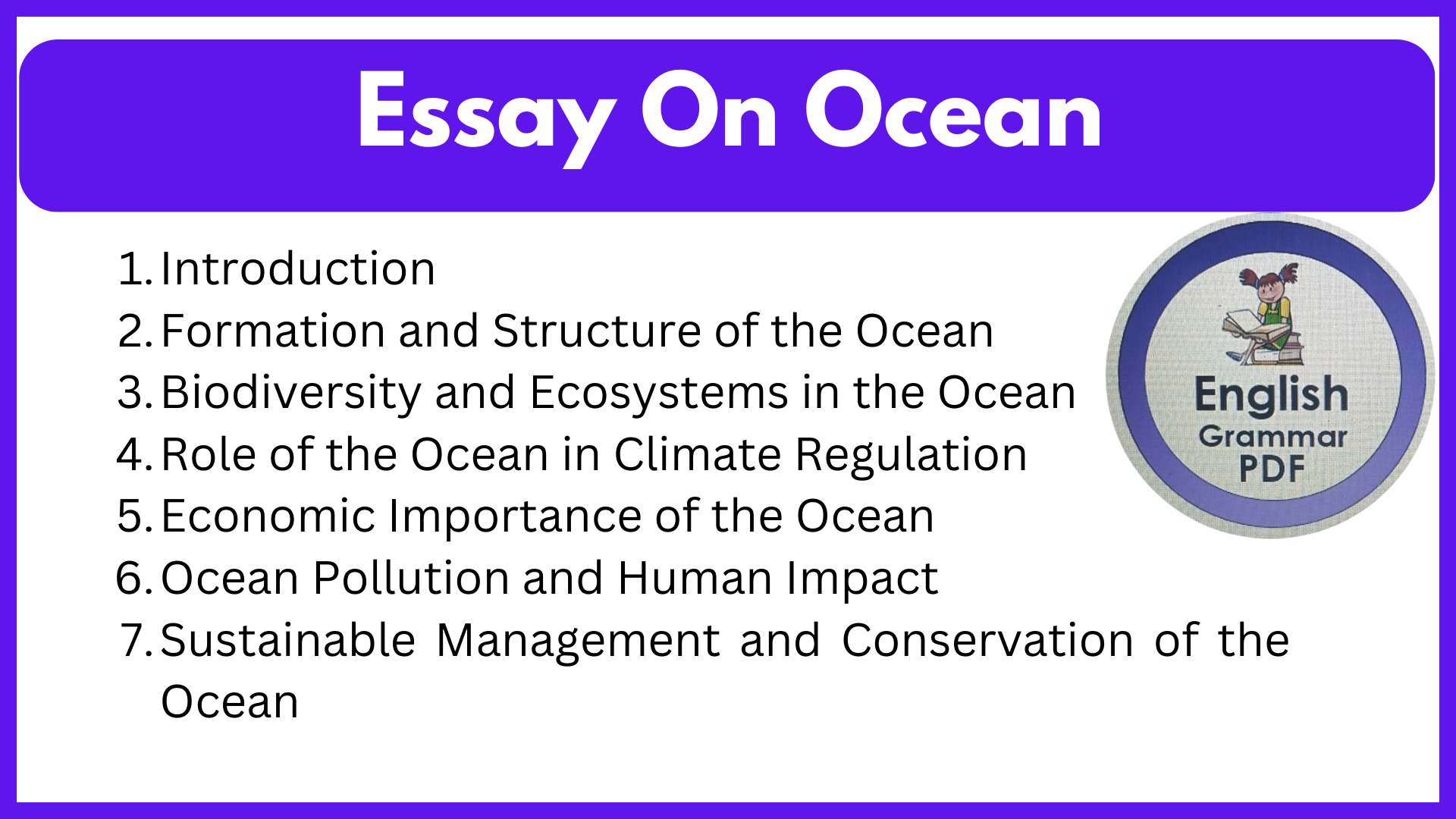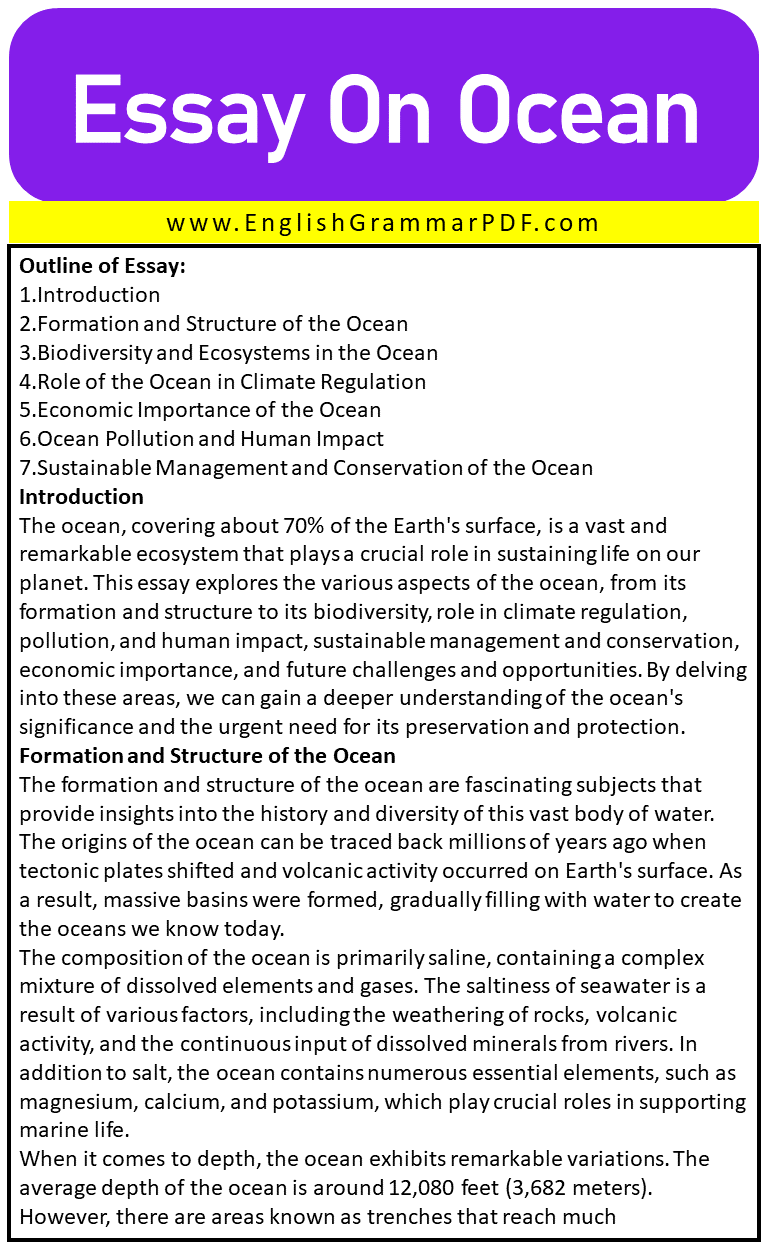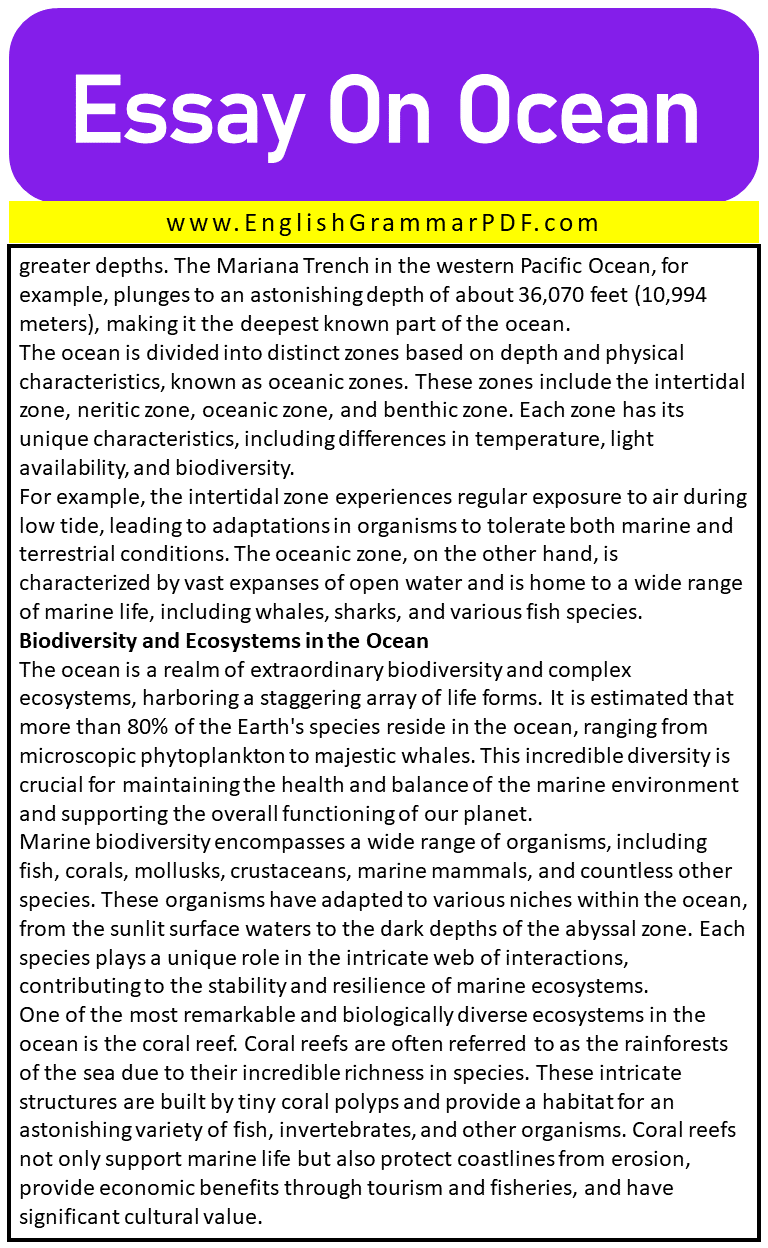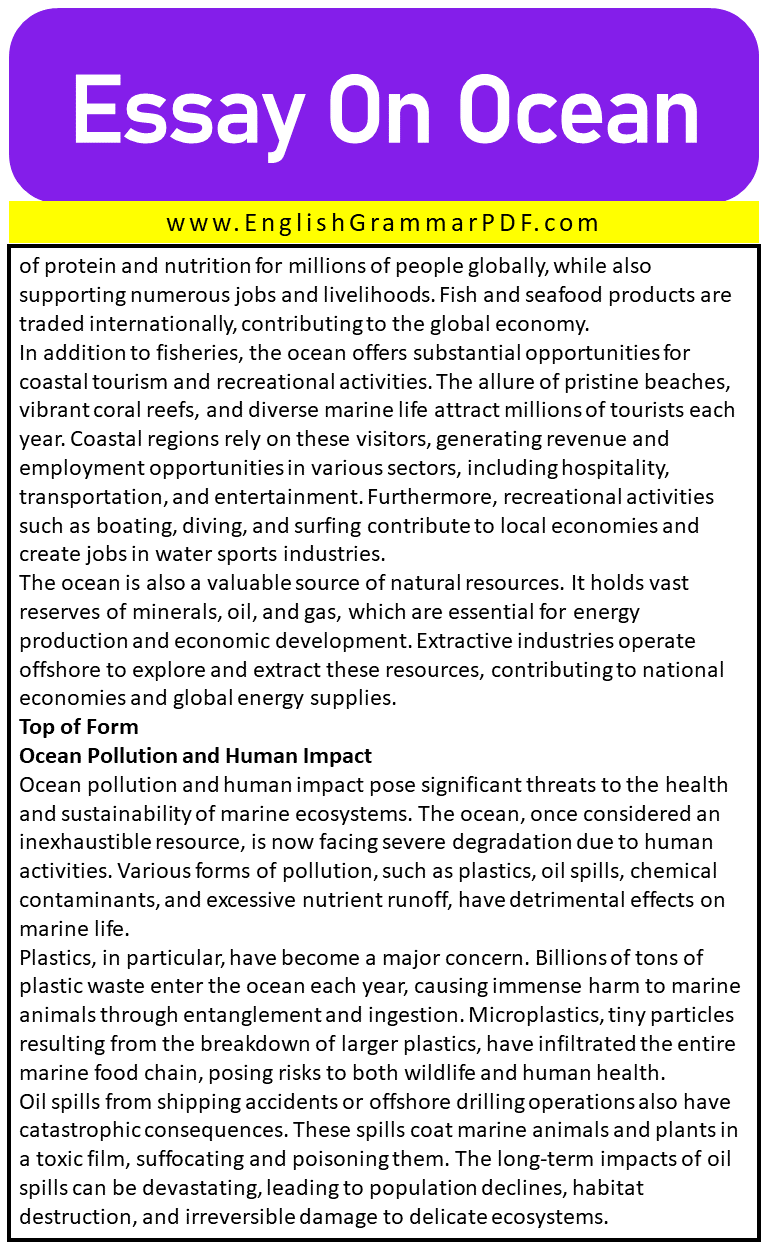Essay On Ocean
Outline of Essay:
- Introduction
- Formation and Structure of the Ocean
- Biodiversity and Ecosystems in the Ocean
- Role of the Ocean in Climate Regulation
- Economic Importance of the Ocean
- Ocean Pollution and Human Impact
- Sustainable Management and Conservation of the Ocean
Introduction
The ocean, covering about 70% of the Earth’s surface, is a vast and remarkable ecosystem that plays a crucial role in sustaining life on our planet. This essay explores the various aspects of the ocean, from its formation and structure to its biodiversity, role in climate regulation, pollution, and human impact, sustainable management and conservation, economic importance, and future challenges and opportunities. By delving into these areas, we can gain a deeper understanding of the ocean’s significance and the urgent need for its preservation and protection.
Formation and Structure of the Ocean
The formation and structure of the ocean are fascinating subjects that provide insights into the history and diversity of this vast body of water. The origins of the ocean can be traced back millions of years ago when tectonic plates shifted and volcanic activity occurred on Earth’s surface. As a result, massive basins were formed, gradually filling with water to create the oceans we know today.
The composition of the ocean is primarily saline, containing a complex mixture of dissolved elements and gases. The saltiness of seawater is a result of various factors, including the weathering of rocks, volcanic activity, and the continuous input of dissolved minerals from rivers. In addition to salt, the ocean contains numerous essential elements, such as magnesium, calcium, and potassium, which play crucial roles in supporting marine life.
When it comes to depth, the ocean exhibits remarkable variations. The average depth of the ocean is around 12,080 feet (3,682 meters). However, there are areas known as trenches that reach much greater depths. The Mariana Trench in the western Pacific Ocean, for example, plunges to an astonishing depth of about 36,070 feet (10,994 meters), making it the deepest known part of the ocean.
The ocean is divided into distinct zones based on depth and physical characteristics, known as oceanic zones. These zones include the intertidal zone, neritic zone, oceanic zone, and benthic zone. Each zone has its unique characteristics, including differences in temperature, light availability, and biodiversity.
For example, the intertidal zone experiences regular exposure to air during low tide, leading to adaptations in organisms to tolerate both marine and terrestrial conditions. The oceanic zone, on the other hand, is characterized by vast expanses of open water and is home to a wide range of marine life, including whales, sharks, and various fish species.
Biodiversity and Ecosystems in the Ocean
The ocean is a realm of extraordinary biodiversity and complex ecosystems, harboring a staggering array of life forms. It is estimated that more than 80% of the Earth’s species reside in the ocean, ranging from microscopic phytoplankton to majestic whales. This incredible diversity is crucial for maintaining the health and balance of the marine environment and supporting the overall functioning of our planet.
Marine biodiversity encompasses a wide range of organisms, including fish, corals, mollusks, crustaceans, marine mammals, and countless other species. These organisms have adapted to various niches within the ocean, from the sunlit surface waters to the dark depths of the abyssal zone. Each species plays a unique role in the intricate web of interactions, contributing to the stability and resilience of marine ecosystems.
One of the most remarkable and biologically diverse ecosystems in the ocean is the coral reef. Coral reefs are often referred to as the rainforests of the sea due to their incredible richness in species. These intricate structures are built by tiny coral polyps and provide a habitat for an astonishing variety of fish, invertebrates, and other organisms. Coral reefs not only support marine life but also protect coastlines from erosion, provide economic benefits through tourism and fisheries, and have significant cultural value.
In addition to coral reefs, the ocean hosts diverse ecosystems in its depths, such as deep-sea hydrothermal vents, cold-water coral reefs, and seamounts. These unique ecosystems support specialized species adapted to extreme conditions, including high pressure, darkness, and extreme temperatures. They serve as a reminder of the resilience and adaptability of life in the face of challenging environments.
Role of the Ocean in Climate Regulation
The ocean plays a crucial role in regulating the Earth’s climate, acting as a major driver of weather patterns and influencing global temperature distribution. Ocean currents, driven by a combination of wind, temperature, and salinity gradients, play a pivotal role in redistributing heat from the equator to the poles. This redistribution helps to equalize temperature imbalances, moderating extreme weather events and maintaining regional climates.
One of the ocean’s significant contributions to climate regulation is through the absorption and storage of heat. The ocean acts as a massive heat sink, absorbing a substantial amount of solar radiation. This process helps to stabilize temperature fluctuations by buffering against rapid changes in atmospheric temperature. Moreover, the ocean’s high heat capacity allows it to release stored heat gradually, thus influencing climate over long periods.
Furthermore, the ocean plays a crucial role in the carbon cycle, impacting global greenhouse gas levels. It acts as a carbon sink, absorbing a significant portion of carbon dioxide from the atmosphere. Through a process called oceanic carbon sequestration, carbon dioxide dissolves in seawater and is subsequently transported to the deep ocean layers. This absorption of carbon dioxide mitigates the impacts of climate change by reducing the amount of greenhouse gases in the atmosphere.
Economic Importance of the Ocean
The economic importance of the ocean cannot be overstated. It serves as a critical driver of economic activity and sustains livelihoods around the world. One of the primary economic sectors associated with the ocean is the fisheries and aquaculture industry. It provides a significant source of protein and nutrition for millions of people globally, while also supporting numerous jobs and livelihoods. Fish and seafood products are traded internationally, contributing to the global economy.
In addition to fisheries, the ocean offers substantial opportunities for coastal tourism and recreational activities. The allure of pristine beaches, vibrant coral reefs, and diverse marine life attract millions of tourists each year. Coastal regions rely on these visitors, generating revenue and employment opportunities in various sectors, including hospitality, transportation, and entertainment. Furthermore, recreational activities such as boating, diving, and surfing contribute to local economies and create jobs in water sports industries.
The ocean is also a valuable source of natural resources. It holds vast reserves of minerals, oil, and gas, which are essential for energy production and economic development. Extractive industries operate offshore to explore and extract these resources, contributing to national economies and global energy supplies.
Top of Form
Ocean Pollution and Human Impact
Ocean pollution and human impact pose significant threats to the health and sustainability of marine ecosystems. The ocean, once considered an inexhaustible resource, is now facing severe degradation due to human activities. Various forms of pollution, such as plastics, oil spills, chemical contaminants, and excessive nutrient runoff, have detrimental effects on marine life.
Plastics, in particular, have become a major concern. Billions of tons of plastic waste enter the ocean each year, causing immense harm to marine animals through entanglement and ingestion. Microplastics, tiny particles resulting from the breakdown of larger plastics, have infiltrated the entire marine food chain, posing risks to both wildlife and human health.
Oil spills from shipping accidents or offshore drilling operations also have catastrophic consequences. These spills coat marine animals and plants in a toxic film, suffocating and poisoning them. The long-term impacts of oil spills can be devastating, leading to population declines, habitat destruction, and irreversible damage to delicate ecosystems.
Chemical pollutants, including heavy metals, pesticides, and pharmaceuticals, contaminate the ocean through industrial and agricultural activities, as well as improper waste disposal. These toxic substances accumulate in the tissues of marine organisms, leading to reproductive issues, developmental abnormalities, and even death.
Excessive nutrient runoff from agricultural activities and wastewater discharge can result in harmful algal blooms, causing oxygen depletion and creating dead zones where marine life cannot survive. These dead zones have devastating effects on fish populations, leading to the collapse of commercial fisheries and threatening the livelihoods of coastal communities.
Human activities, such as overfishing and destructive fishing practices, further exacerbate the problem. Unsustainable fishing practices, including bottom trawling and dynamite fishing, damage habitats and deplete fish populations, disrupting the delicate balance of marine ecosystems.
Addressing ocean pollution and minimizing human impact requires collective action. It is crucial to reduce the use of single-use plastics, improve waste management systems, and promote recycling and circular economy practices.
Implementing stricter regulations on industrial and agricultural pollution, as well as investing in wastewater treatment infrastructure, can help mitigate the discharge of harmful chemicals into the ocean. Embracing sustainable fishing practices and establishing marine protected areas are vital steps toward restoring the health and resilience of marine ecosystems.
Sustainable Management and Conservation of the Ocean
Sustainable management and conservation of the ocean are essential for the long-term health and well-being of our planet. Recognizing the significance of the ocean as a vital ecosystem and the need to protect its resources, efforts are being made worldwide to promote sustainable practices and ensure its preservation for future generations.
One crucial aspect of sustainable management is the establishment of marine protected areas (MPAs). These designated zones help safeguard vulnerable habitats and biodiversity by limiting or prohibiting activities that may harm the ecosystem. MPAs not only provide a haven for marine species but also support the recovery of degraded areas and promote the sustainable use of resources.
In addition to MPAs, sustainable fishing practices are crucial for maintaining fish stocks and ensuring the viability of the fisheries industry. Implementing measures such as catch limits, gear restrictions, and monitoring systems helps prevent overfishing and allows fish populations to replenish. Furthermore, promoting responsible aquaculture practices can reduce the pressure on wild fish stocks and provide a sustainable source of seafood.
Reducing pollution and addressing the sources of marine debris are also integral to ocean conservation. Efforts to minimize plastic waste, improve waste management systems, and promote recycling can prevent the accumulation of harmful pollutants in the ocean and protect marine life from the detrimental effects of pollution.
Education and awareness play a vital role in sustainable ocean management. By educating communities, policymakers, and the general public about the importance of the ocean and the impacts of human activities, we can foster a sense of stewardship and inspire collective action. Encouraging individuals to make environmentally conscious choices, such as reducing single-use plastics and supporting sustainable seafood options, can have a significant positive impact on ocean conservation.
FAQ’s
What is the most important thing in the ocean?
The biodiversity in the ocean is the most important thing. It encompasses a wide range of species, from microscopic plankton to majestic marine mammals, and plays a crucial role in maintaining the balance of marine ecosystems.
What is unique about the ocean?
The ocean is unique due to its vastness and depth. It covers around 70% of the Earth’s surface and holds the deepest point on the planet, the Mariana Trench. Its diverse ecosystems, from coral reefs to deep-sea habitats, are also unparalleled in their complexity and beauty.
Explore More Essays:
Essay On The Great Wall Of China
Download the PDF of the Essay:









